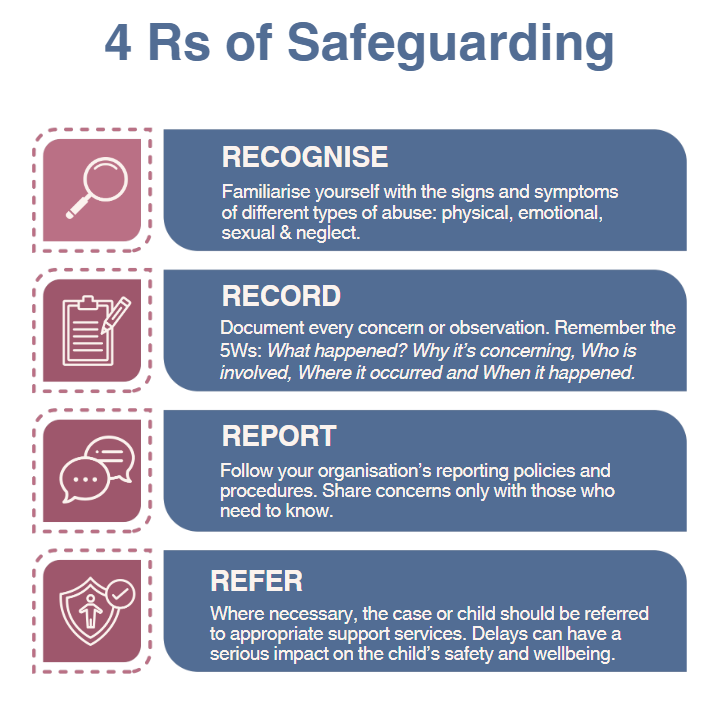Introduce
The 4 Rs of safeguarding—Recognise, Record, Report, and Refer—provide a clear framework for protecting children and prioritising their wellbeing. They offer a guide to help you identify concerns, document information accurately, take prompt action, and connect children and families with the support they need.

It is important for you to know who in your organisation has responsibility for safeguarding and child protection so that you know who to report your concerns to. This role is often referred to as the Designated Safeguarding Lead (DSL).
The following information on the NSPCC website gives further insight into how you might recognise abuse in the early years.
Develop
If you think a child may be at risk of abuse or neglect, you should:
- If the child is in immediate danger, contact the police on 999
- Follow your organisation’s safeguarding policies and procedures
- Contact your local child protection services. Their contact details can be found on the website for the local authority the child lives in
- You can also contact the NSPCC Helpline on 0808 800 5000 or email help@nspcc.org.uk for advice and guidance
- Online safety concerns can also be reported to the Internet Watch Foundation (IWF). If you know a child or young person who has had a sexual image or video of themselves shared online, you can discuss the option of using the IWF’s Report Remove tool.
Thresholds of child protection interventions are complex, and determined by children’s social care. A child who is likely to suffer significant harm or is at risk of significant harm is meeting the threshold defined in the Children Act 1989. However, if your concern doesn’t meet certain thresholds, the child or family may still be able to access support through early help or additional services.
Reflect
Manchester Safeguarding Partnership challenges everyone to consider: if you are in any doubt about reporting a concern don’t think ‘What if I’m wrong?’ think ‘What if I’m right?‘
Stop and Reflect: Consider the reflective questions:
– Are you familiar with your organisation’s safeguarding and child protection policies and procedures?
– Do you know who in your organisation is responsible for safeguarding and child protection? Are you clear on how to contact them and who else has responsibility if they are unavailable?
– What challenges or barriers might prevent you from raising and reporting safeguarding concerns?
– What steps can you take to ensure you can overcome these barriers?
Optional
Further resources and guidance:
Manchester Safeguarding Partnership
Child abuse concerns: guide for practitioners – GOV.UK
NSPCC – Safeguarding and child protection in the early years






